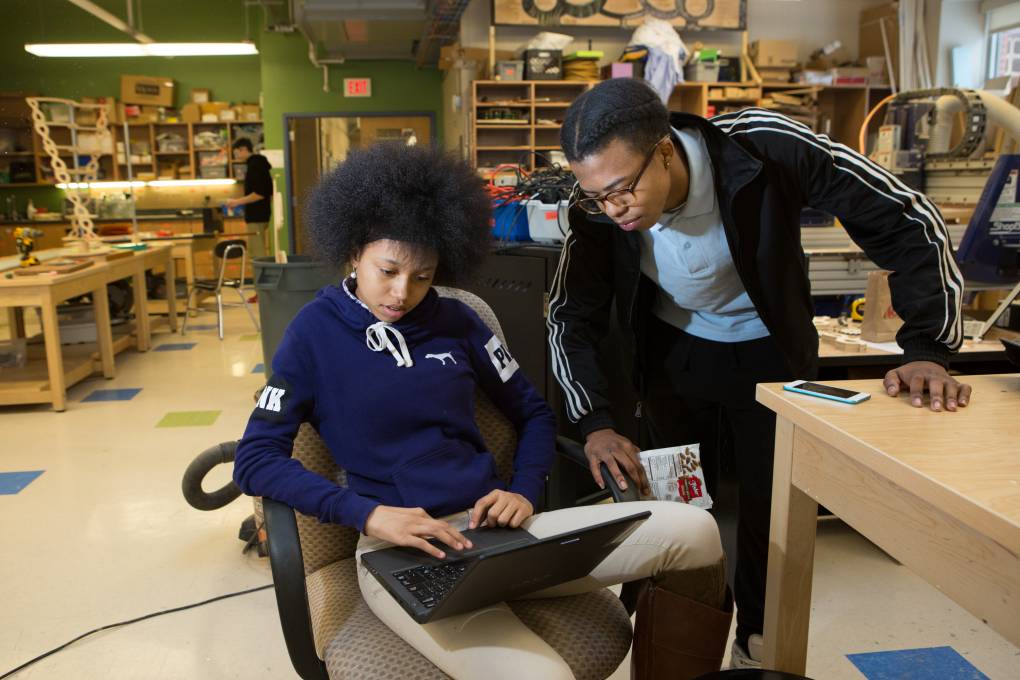According to research, project-based learning can improve students’ retention and engagement. Additionally, project-based learning is well-suited to support 21st century skills, including critical thinking and self direction. “One of the most important 21st-century skills is learning to figure things out independently,” Bacon emphasized. The Genius Bar at Ossining Middle School aligned with students’ interests while equipping them with relevant skills to navigate and adapt to the ever-changing technological landscape.
Encouraging agency and independent learning
The learning didn’t stop at computer batteries, according to Bacon. Learning how to repair something they use every day with their own hands piqued students’ interest. Bacon and network specialists brought a few broken Chromebooks to one of the lunchtime training sessions and took them apart. “[The network specialist] actually showed every piece, every wire, what it is, what it does and how to unclip it,” Bacon said. The kids were able to take all of these broken devices and harvest the different parts and use them to repair other devices.
The Genius Bar’s success evolved from an informal lunchtime group to an after-school club where students could learn more about and fix Chromebooks. Students recognized how to make hardware repairs for their peers. Students were learning to be independent, Bacon said. “Rather than it going upstairs to have somebody do it, they can do it right there in the library,” Bacon added.
Last year, Bacon got a grant to get a 3D printer and Genius Bar students said that they’d meet after school to put it together. “I was like ‘They’re 11 and 12 [years old] and this is like $2000 worth of stuff,”’ said Bacon. “But the reality is that people will rise to the bar that is given to them.” With help from one of the technology instructors, the students put together their 3D printer. Since then, they have also assembled microphones for podcasting and a mixing board.
Engaging all students, not just the high achieving ones
Students, regardless of academic standing, found value in the Genius Bar program, including those needing additional learning support and English language learners. Bacon attributes this to the fact that technology doesn’t only impact high achieving students. “We’ve all been using technology,” she said.Some students learned to log into Chromebooks for the first time, while others eagerly disassembled computers. “[Hardware repair] is not a skill that we necessarily teach in school every day,” Bacon pointed out. “Unfortunately, kids have these wonderful skills that don’t always align academically with the things we’re doing. So this space really lets kids shine in fixing and understanding and just seeing how things are put together.” As a result, some students now aspire to tech-related careers, while others simply appreciate the practical knowledge.
21st century skills and high school
The Genius Bar’s impact was so significant that students advocated for a similar program at the high school level. They proposed an elective to the high school principal, who agreed to offer an accredited course. Bacon helped the students present their proposal to the Board of Education, leading to the launch of the Ossining High School Genius Bar class for the 2023-24 school year.
“We want them to be able to run the help desk — a student help desk,” said Oumar Sarr, who teaches the high school Genius Bar class. “We are also working in partnership with the tech department to get the students to learn the basics of troubleshooting computers, fixing some little problems that students and some teachers even have with their technology devices.” The class also includes a Google Level 1 certification that teaches students proficiency in Google Classroom tools like Gmail, Drive, and Calendar.
Sarr’s goal is to encourage students to think creatively about technology, not just as consumers but as critical thinkers who can shape it. “We started talking about AI technology and the impact it can have on students and our communities,” Sarr explained. “They are discovering that technology, like everything else, needs to be channeled. It needs to be put into a route that will help, because if not, technology can be destructive.”
